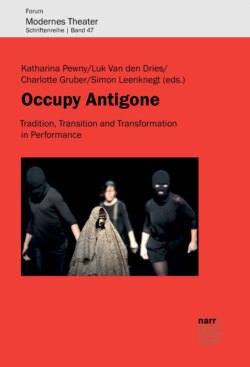Читать книгу Occupy Antigone - Группа авторов - Страница 10
На сайте Литреса книга снята с продажи.
2. Heidegger’s deinon
ОглавлениеThe crucial issue for our present discussion is how to interpret the notion of deinon, which is a concept that has a broad range of meanings. The following five points give an overview of its contradictory connotations:
1 It can mean fearful, terrible, dread, dire, in Sophocles also danger or suffering awe
2 The term projects a sense of being powerful, related to being able, clever, cunning and skilful
3 It also refers to force or power – mighty, powerful, wondrous, marvellous or strange. In his German translation from 1804, Hölderlin used "ungeheuer", which was used by Brecht in his 1948 adaptation, meaning awesome, monstrous
4 For Heidegger on the other hand it means violent, which in a strange combination with unheimisch – not homely, is the particular connotation he developed on the basis of deinon as uncanny (unheimlich) instead of ungeheuer
5 And as we shall finally see, in Brecht’s interpretation, the deinon of a human is his ability, even his fatal attraction for becoming his own enemy, which is the ultimate form of negation through annihilation
One of the many occasions when Heidegger formulated his position with regard to deinon was in a lecture course in 1935 at the University of Freiburg, where he was then the rector. These lectures were first published as An Introduction to Metaphysics in 1953. Here Heidegger emphasized that
deinon means the powerful in the sense of one who uses power, who not only disposes of power [Gewalt] but is violent [gewalt-tätig] insofar as the use of power is the basic trait not only of his action but also of his being-there [Dasein]. Here we use the word violence in an essential sense extending beyond the common usage of the word, as mere arbitrary brutality. In this common usage violence is seen from the standpoint of a realm which draws its standards from conventional compromise and mutual aid, and which accordingly disparages all violence as a disturbance of the peace. […] Man is deinon, first because he remains exposed within this overpowering power, […] But at the same time man is deinon because he is the violent one […] he gathers the power and brings it to manifestness. Man is the violent one, not aside from and along with other attributes but solely in the sense that in his fundamental violence [Gewalt-tätigkeit] he uses power [Gewalt] against the overpowering [Überwältinge]. Because he is twice deinon in a sense that is originally one, he is to deinotaton, the most powerful; violent in the midst of overpowering.1
Even if it sounds like Heidegger talks about the two sides of deinon, he actually disambiguates the term to mean nothing but violence.
However in his seminar on the Hölderlin-hymn The Ister, which Heidegger also conducted at the University of Freiburg, now in the summer of 1942, he also included a more detailed reading of the “Ode to Man” more directly valorising state power/violence, while at the same time reintroducing an expression of radical ambiguity with regard to which forms of violence are an essential aspect of what it means to be human. In 1942 Heidegger also more openly exposed his hermeneutic strategy, rejecting the rendering of deinon as ungeheuer, which Hölderlin had used in his translation of the play. Instead of ungeheuer, Heidegger insists on understanding deinon as unheimlich – “uncanny” – which at this time had already been used by Freud, an author Heidegger probably never read.
Heidegger’s interpretation or ’adaptation’ of Hölderlin’s translation of deinon as "unheimlich" (uncanny) is based on an intentional, even somewhat paradoxical resistance towards the complex double nature of being human expressed in the “Ode to Man”. Or as Heidegger himself explains, he chose this translation because it "is initially alien to us, violent, or in ’philological’ terms ’wrong’".2 And immediately following this gesture of resistance, Heidegger asks how it is possible to decide about the correctness of a translation, beyond the mere dictionary meaning of a word. Or according to Heidegger’s own explanation:
In most cases a dictionary provides the correct information about the meaning of a word, yet the correctness does not yet guarantee us any insight into the truth of what the word means and can mean, given that we are asking about the essential realm named in the word.3
In what follows, Heidegger argues that central texts by Kant and Hegel are actually "in need of translation" because
It pertains to the essence of a historical people to extend like a mountain range into the lowlands and the flatlands and at the same time to have its occasional peaks towering above into an otherwise inaccessible altitude. […] Translation must set us upon the path of ascent towards the peak.4
According to Heidegger, translation can be seen as a legal process, making something understandable, which "means awakening our understanding to the fact that the blind obstinacy of habitual opinion must be shattered and abandoned if the truth of a work is to unveil itself".5
But Heidegger takes an additional step beyond this arbitrary relation to translation by phonologically, but without any solid etymological basis, reading unheimlich as unheimich (‘unhomely’), explaining that
[b]eing unhomely is no mere deviance from the homely, but rather the converse: a seeking and searching out the homely, a seeking that at times does not know itself. This seeking shies at no danger and no risk. Everywhere it ventures and is underway in all directions.6
Heidegger’s reading, appropriating or seeking for the “homely” – actually the Heimat – regardless of the dangers involved, no doubt reflects the situation of Germany as Heidegger understood it during the summer of 1942, at a moment in history situated ’between’ the Wannsee conference and the battle of Stalingrad.
